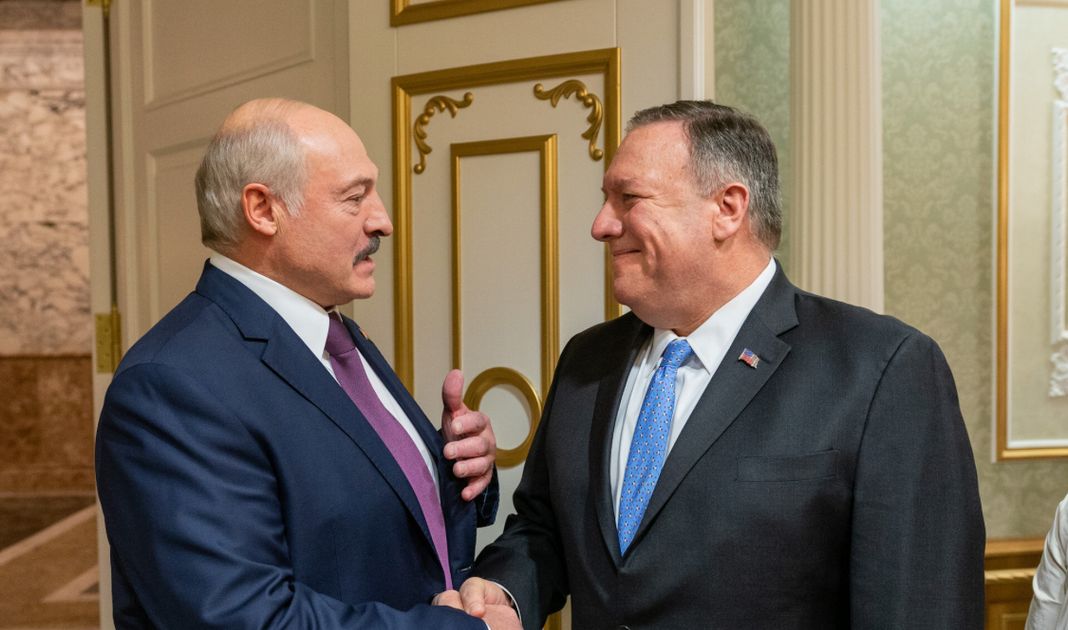Intermarium Weekly 19-26.08.2020

Secretary Pompeo Meets With Belarusian President Lukashenko, February 1st 2020 (flickr.com)
US to pursue non-interventionist approach?
US Deputy Secretary of State Stephen Biegun met with Belarusian opposition leader Svetlana Tikhanovskaya in Vilnius on Monday, but underlined that the United States would not interfere in the political process in her country. According to the diplomat, the US administration condemns violence against peaceful protesters in Belarus and calls on the government to release all political prisoners, but it is up to the Belarusian people to decide the course of events in their country: “The United States cannot and will not decide the course of events in Belarus. This is the right of the Belarusian people as enshrined in the United Nations universal charter of human rights and also in the OSCE charter.”
Economist argues strikes counterproductive
Vasily Gursky, Director of the Institute of Economics at the National Academy of Sciences of Belarus (NASB), stated that “the shutdown of enterprises means not only a decline in GDP and a drop in exports, losses for enterprises and a shortfall in budget revenues. Primarily, this is the lack of funds to pay salaries and pensions. Strikes are counterproductive. They are aimed at stimulating social tensions and transforming them into economic turmoil. After all, when people are not paid their wages during the idle time of the enterprise, they will not blame those who incited them to the strike, they will blame the state, which seeks to preserve the country’s production potential.”
The authorities sense the danger from the strike at factories and have therefore initiated a process of intensive negotiations with workers. They are promising political and economic changes in exchange for neutrality during the struggle against the opposition and protesters. The Trade Unions are taking a leading role in this process, but again the arguments are the same: if you are going to strike, remember that there will be no salaries or any other compensation. It seems that in the large and successful factories, for example, Belaruskali, they have convinced people that the protests are going to harm their earnings.
“Remain” campaigns launched in Belarus
Another narrative deployed against the opposition is that an exit from the Union State and the Eurasian Economic Union (EAEU) would harm businesses, the banking system and the Belarusian Ruble. As the westernmost country within the EAEU, Belarus enjoys an element of prestige as a supplier of industrial products to Russian-speaking markets in the east and indeed it is unclear how it would be able to reorient its economy towards the west.
Golovchenko defends CSTO membership
Roman Golovchenko, the Belarusian prime minister, was asked in a TV interview to talk about the potential consequences of leaving the Collective Security Treaty Organisation (CSTO). “This is clearly aimed at breaking the military-political partnership between the Russian Federation and the Republic of Belarus,” he replied, “because we are in fact in a single defense space both within the framework of the CSTO and within the framework of the Union State. This includes a whole range of issues: from military personnel training to common plans for the use of the group of troops and forces and so on. This is also a military-technical component, i.e. supply, maintenance, modernization of weapons. … Direct losses for our defense industry will be about $300-350 million annually. As part of the CSTO we purchase weapons, military and other special-purpose equipment at domestic prices, not export ones.”
EU top diplomat on Lukashenko: “We have to work with him!”
The High Representative of the European Union for Foreign Affairs and Security Policy, Josep Borrell, offered some interesting soundbites in an interview with El Pais: “Tensions between Europe and Russia were settled with shooting, with violence and the disintegration of Ukraine’s territory that has lasted to this day. … The Belarusians’ problem today isn’t to choose between Russia and Europe, it’s to obtain liberty and democracy. … Europe has no intention of turning Belarus into a second Ukraine. … Maduro and Lukashenko are in exactly the same situation. We don’t recognise their elections as legitimate. Nevertheless, whether we like it or not they control the government and we have to continue dealing with them, although we don’t recognise their democratic legitimacy.”
Lavrov brandishes the N-word
It will not come as a huge surprise to anyone that Russian foreign minister Sergei Lavrov has also been warning of a second Ukraine: “I believe that the clear signs of the situation getting normal are quite important. I also know that not everyone likes this and there are those who wish to make this normal, peaceful trend of the developments in Belarus violent after all, provoke bloodshed and turn them into the Ukrainian scenario. … Our approach is very simple: this is an internal affair of Belarus. Belarusians can quite cope with the situation on their own, being a wise people. The main thing is to make sure that unrest is not provoked from the outside. … We will not be against any decision, which the Belarusian leadership will make on dialogue with its population. But when the West says that only mediation with the participation of Western countries will be effective, everyone, of course, has fresh memories about how it all developed in Ukraine when the Western mediation made our corresponding partners fully unable to comply with their commitments.”
Belarus as logistics hub
Lithuanian Transport Minister Jaroslav Narkevič last week highlighted the need to be prepared for alternative routes home for trucks located in Ukraine: “We intend to discuss with Poland the option of returning our carriers through Poland, bypassing Belarus. So far there is no such need, but we are ready for it.” At the same time, the Ukrainian government recently took steps towards a liberalisation of rules on road traffic freight between Ukraine and Belarus.
Infrastructure investments in Ukraine
Ukrainian President Volodymyr Zelenskyy has been pushing for parliament to adopt a law on inland waterway transportation which it’s said will contribute to an increase in freight traffic up to 35 million tons per year. The law will provide financing for safe river infrastructure, stimulate shipbuilding and open the admission of ships under a foreign flag to the inland waterways of Ukraine.
The Ukrainian Sea Ports Authority (USPA) announced a tender for the concession of the Port of Chornomorsk in 2021, which it’s thought will attract potential investors from Georgia, Azerbaijan, Turkey, Bulgaria and Norway. The rail-ferry complex just south of Odesa requires around €5 million of investments including a new parking lot for trucks, a passenger terminal and a video surveillance system. Of far greater significance is the €100 million set to be invested in the Port of Olvia (Mykolaiv) over the next five years by Qatari-owned Qterminals. The concession agreement was signed at a virtual ceremony in Doha and Kyiv this week.
In cooperation with the World Bank and the European Bank for Reconstruction and Development (EBRD), preliminary feasibility studies have also been prepared for the concession of three Ukrainian airports and six road sections (total length 1500 km), ideally on the basis of a public-private partnership. Some analysts have expressed scepticism, for example Olga Magaletska of the National Investment Council of Ukraine: “Previously, one of the most attractive areas for investment was infrastructure, namely, concession of airports, but after the pandemic the world will change, the focus of interest will change. I do not think that now regional airports will be considered by potential investors as one of the most interesting topics.”
Ukrainian MoD orders anti-ship missiles
The “Neptune” anti-ship coastal missile system, developed by Kyiv-based Luch Design Bureau, has been officially adopted by the Ukrainian Armed Forces. It’s thought that the first of three systems will be ready within the next 11 months. One system contains a mobile command and control post, three launcher batteries consisting of two USPU-360 launchers each, an operational support battery consisting of six transporter/transloader vehicles each carrying a TPK-360 storage/transport/launch canister. Total ammunition is 72 R-360 cruise missiles. Each launcher can be loaded with four missiles, meaning a full salvo of 24 missiles. The time lag between each missile in a salvo is three to five seconds. Time from end of mission to ready-to-fire time for the next mission is under 15 minutes. The R-360 missile weighs 870 kg (including a warhead weight of 150 kg) and has a speed of 900 km/hr. It is capable of hitting a target at a distance of up to 280 km, and the capacity of its warhead is enough to sink a ship with a displacement of up to 5,000 tons.
Further UK-Ukraine military cooperation planned
British defence minister Ben Wallace made his second visit to Kyiv last week to announce a multinational maritime training initiative to help the Ukrainian Navy improve its ability to counter threats in the Black Sea: “Courses will be delivered by the Royal Navy and naval personnel from Sweden, Canada and Denmark in areas such as navigation, operational planning, military diving, sea surveillance, fire-fighting and damage control. More nations are expected to join in the near future.” This is on top of Operation Orbital, which began in February 2015 to provide guidance and training to the Ukrainian Armed Forces and will continue until March 2023.
Romania urged to reject Chinese 5G
US Ambassador to Romania Adrian Zuckerman penned an open letter last week in which he denounces Huawei as “a company indicted for intellectual property theft, conspiracy, wire fraud, bank fraud, racketeering, and for helping Iran avoid sanctions meant to stop that nation from funding terrorism. … Information and infrastructure are power which should not be given to the Chinese nation that ascribes to an absolute authoritarianism that Romania and many other Eastern European countries are still recovering from.” Nokia, Ericsson and Samsung are all mentioned as alternative 5G infrastructure providers. “The Chinese Communist Party,” he continues, “is incredibly experienced with using technology for surveillance and oppression. There is no place for crooked communist Chinese companies in a free and democratic Romania.”
Joint sanctions against Lukashenko regime
Latvia and Estonia plan to introduce individual sanctions against Belarusian officials responsible for the falsification of presidential election results and the use of excessive force against peaceful protesters in Belarus prior to the introduction of EU sanctions. It was stated that both countries “highly value observance of political rights and democratic standards throughout the world.”
Autor
Ridvan Bari Urcosta
Senior Analyst at Strategy&Future






Trwa ładowanie...